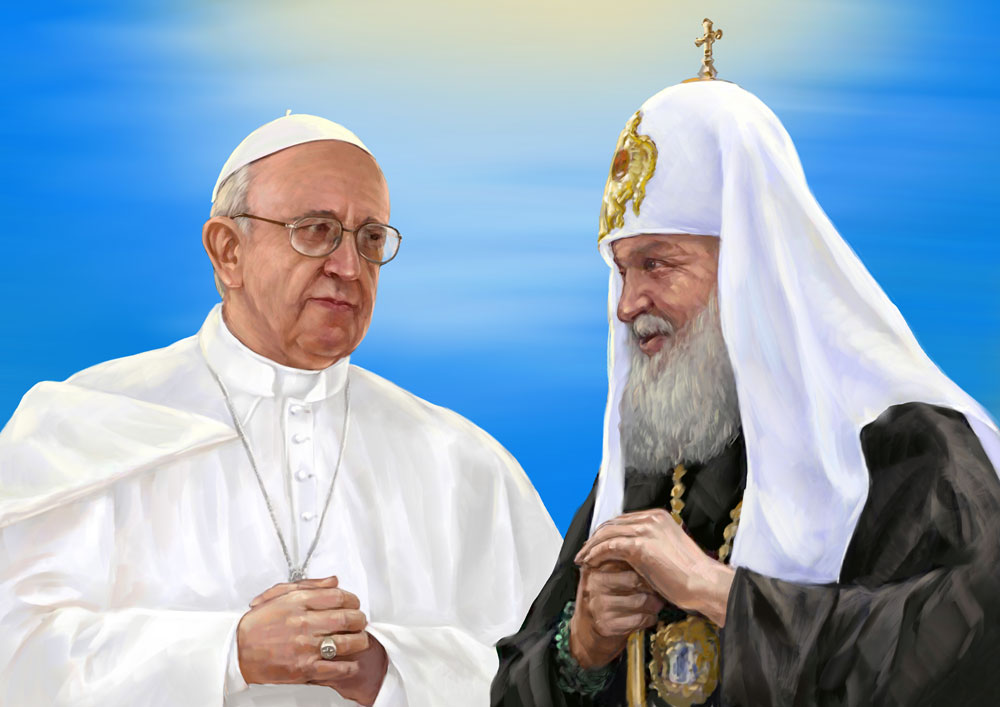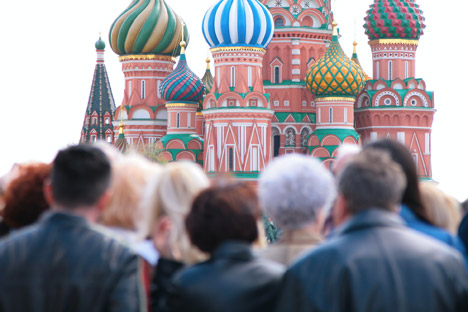A millennium move at Havana Airport

Drawing by Dmitry Divin
I wrote my first article on the intended meeting between the Roman Catholic Pope and the Russian Orthodox Patriarch almost 20 years ago. That meeting failed to take place in Hungary, as did the next intended one, in Austria. Over the years, time and again, the Moscow Patriarchate has either denied reports of a planned meeting as unsubstantiated or struggled to explain why the encounter was premature.
An historic first meeting between the leaders of the world’s two largest church bodies was finally announced last week. It is scheduled to take place on Feb. 12th in a somewhat curious location: the airport in the Cuban capital, Havana.
So, why is it that such a meeting was not possible for 20 years and why is it suddenly happening now?
The long journey began with Pope John Paul II, who was keen to reach out to the Christian East. His was the famous maxim that “the Church must breath with her two lungs.”
Yet this eastward drive by the Polish-born Pope created a problem for the Russian Orthodox (RO). In the 1990s, as the constraints of the Soviet atheist state crumbled, the (RO) church enjoyed a tremendous growth in Russia, while simultaneously competing against a legion of foreign missionaries. The Roman Catholic Church was not the largest force among those. But it had the richest history of centuries-old Orthodox-Catholic competition. The defensive position, in which the Russian Church found itself, fed a strong grassroots anti-ecumenical movement that put pressure on the hierarchy to restrict their ties with non-Orthodox Christians.
There were occasional problems as the Vatican re-established its structures in Russia. But the real wound was Ukraine, whose western part, originally Orthodox, converted to Catholicism when it was a part of Poland in 1596. The Ukrainian Greek Catholic Church (UGCC) that took root there was officially subjugated to the Moscow Patriarchate by the Soviet state in 1946, while partly remaining in catacombs.
After its legalization in 1989, a period far removed from “ecumenical spirit” followed when the Greek Catholics reclaimed their properties, often violently, in a process that the Orthodox described as the destruction of their three dioceses in Western Ukraine.
Against such a background, the Moscow Patriarchate found it impossible to agree to a papal visit to Russia and wanted a potential meeting in a third country to yield an agreement on the Ukraine issue. That, in turn, was a no-go for the Vatican, which could not betray its faithful in Ukraine.
That doesn’t mean that no attempts were made to break out of the deadlock. In 2006, a conference in Vienna co-chaired by then Metropolitan Kirill and Cardinal Paul Pupard set a new agenda for bilateral relations: common witness of traditional Christian values in the increasingly secularized Europe. Contacts on this matter intensified when Metropolitan Kirill, the long-time “foreign secretary” of the Russian Church, became Patriarch in 2009. But the much awaited historical meeting was still a far cry, especially since the political turmoil in Ukraine reignited the complex church politics in the country.
The meeting in Cuba is hence the outcome of a total paradigm shift. The problems in Ukraine remain unsolved, an “unhealed blooding wound that prevents the full normalization of relations between the two churches,” Metropolitan Hilarion, the Moscow Patriarchate’s chief external relations official said last week. But the catastrophe of Christians in the Middle East and North and Central Africa require urgent measures. “In the present tragic situation, it is necessary to put aside internal disagreements and unite efforts to save Christianity in the regions where it is subjected to the most severe persecution”, he said.
The venue of the historic meeting in an airport away from the two churches’ traditional battleground in Europe is meant to emphasize the new global agenda and its urgency. The theological issues separating the churches cannot be discussed in two hours. It is easy to predict that the joint declaration the pontiffs are to sign will either say nothing about Ukraine or be limited to a most general call for peace. Yet, an historic meeting it will be, as it will demonstrate a common witness of the world’s two biggest churches which have been at odds for the longest period and whose earthly conflicts are not yet exhausted.
Andrei Zolotov is an award-winning Russian journalist and commentator, who is now executive editor (Europe) for Russia Direct. He has been Vienna bureau chief for the Russian News and Information Agency RIA Novosti, founder and chief editor of Russia Profile (www.russiaprofile.org), deputy head of RIA Novosti's foreign language service and senior political correspondent for The Moscow Times.
Zolotov has a long-standing interest in the issues of Russian media, relations between the church and society in Russia and Orthodox Christianity worldwide. He was one of the founding members of the Valdai Discussion Club.
All rights reserved by Rossiyskaya Gazeta.
Subscribe
to our newsletter!
Get the week's best stories straight to your inbox
